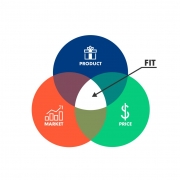On fear of failure

“Too many of us are not living our dreams because we are living our fears,” wrote Les Brown. Fear is a natural human emotion that helps us stay alert and protected in dangerous situations. However, when fear becomes excessive, it can prevent us from living our lives to the fullest. It can hold us back from pursuing our dreams, taking risks, and experiencing new things. In this self-serving article, I would like to explore strategies for conquering fear and living a more fulfilling life, particularly the fear of failure, which can impact our lives by preventing us from following our hearts and achieving our full potential.
Conquering fear has been a major theme in my own life. Leaving my hometown of Florianópolis, Brazil, to explore the world with no money, learning new languages despite ridicule, and leaving comfortable career paths to find what truly makes me come alive, are all examples of how conquering fear has stretched my possibilities in unimaginable ways.
The fear of failure is a common and powerful fear that can hold us back from pursuing our goals and dreams. I have met many overachievers who have put several ambitious personal and professional projects on hold due to the fear of not being able to deliver on these new paths. However, science shows us that with the right mindset and strategies, we can learn to overcome this fear and achieve our full potential.
A learning opportunity
One of the first steps in overcoming the fear of failure is to change our perspective on what failure means. Instead of viewing failure as a negative outcome, we can reframe it as a learning opportunity. Every failure is an opportunity to grow and improve, and by embracing this mindset, we can reduce the power of our fear of failure. It is important to remember that everything that has been created in this world was created by people similar to you and me, and they all had to go through a learning process with very few getting it right on the first attempt.
Set realistic goals
Another effective strategy for overcoming the fear of failure is to set realistic goals and break them down into smaller, achievable steps. By focusing on incremental progress rather than perfection, we can reduce the pressure we put on ourselves and increase our confidence in our ability to succeed. Perfectionism is a powerful enemy if we want to design and execute new projects; the best path is to get it done little by little and then iterate and improve it, like in the Design Thinking process.
Revisit your beliefs
It can also be helpful to identify and challenge the underlying beliefs that contribute to our fear of failure. For example, we might have a belief that success is only achieved by those who are naturally talented or lucky. By challenging this belief and recognizing that hard work and perseverance are also key factors in success, we can reduce the power of our fear of failure. As Angela Duckworth has shown, grit is a major determinant of professional success. It is a matter of trying, iterating, learning, and doing it again and again.
Be kind to yourself
Practicing self-compassion is also important when dealing with the fear of failure. Rather than being overly critical of ourselves when we experience setbacks or failures, we can practice self-kindness and remind ourselves that everyone experiences failure at some point in their lives. For type A overachievers (like myself), it’s much easier to be kind to others than to ourselves, as our bars are always set high. However, by talking to others, changing contexts, and expanding one’s life through multiple genuine relationships, we gain perspective on what we’re trying to accomplish, allowing us to detach from perfectionism.
Share where you are heading to
Seeking support and accountability from others can be a powerful tool in overcoming the fear of failure. By sharing our goals and progress with a trusted friend, family member, or mentor, I have gained encouragement, guidance, and motivation to keep pushing forward even in the face of obstacles. I have three people in my life that I call my personal board of advisors, folks who are present to me when I need them and who ask me the right questions at the right time, making me accountable for my decisions and actions while encouraging me to go further.
Accept that life is short and the others’ opinions don’t matter
Lastly, I would like to recall some of the lessons from Vietnamese Buddhist Zen master Thich Nhat Hanh. Thich states that “without fear, we are able to see more clearly our connections to others. Without fear, we have more room for understanding and compassion. Without fear, we are truly free”. When reflecting that most of our fear of failure is based on how others will judge us, I found helpful to highlight the five remembrances from Buddhism that Thich elaborates on his book “Fear”:
- I am of the nature to grow old. I cannot escape growing old.
- I am of the nature to have ill health. I cannot escape having ill health.
- I am of the nature to die. I cannot escape death.
- All that is dear to me, and everyone I love, are of the nature to change. There is no way to escape being separated from them.
- I inherit the results of my acts of body, speech, and mind. My actions are my continuation.
Recognizing that life is short and that change is the only certainty, allows me to see life in perspective and to not care to how others will potentially judge me for a project that fails. Not caring about others’ opinions is a form of freedom, and the path to listen and be your authentic self.
In summary, conquering the fear of failure is essential to our evolution as human beings. Conquering fear is expanding our comfort zones, learning new things about ourselves, connecting to our authentic selves and allowing us to dream bigger and do more of what makes us unique. This, ultimately, is what the world needs: a community of people who are living their unique strengths, collaborating with each other and making the world a better place.








